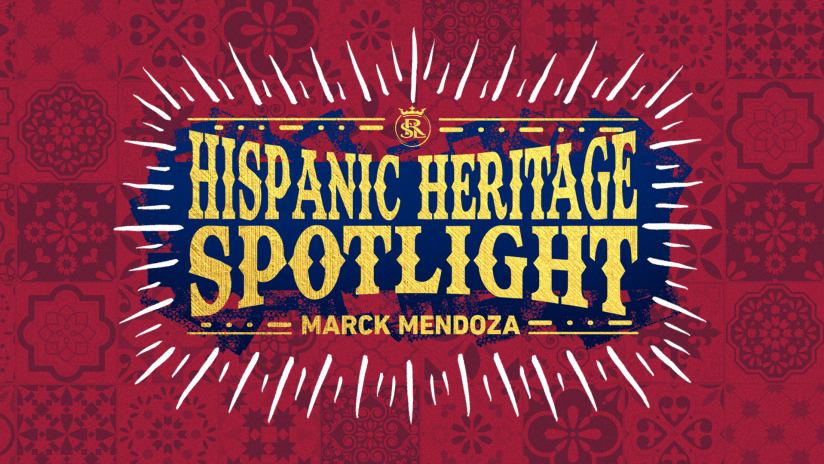Huddled around the television in the living room of his family’s house in South Florida, 11-year-old Marck Mendoza had never felt prouder of his Ecuadorian heritage. His father had gotten off work at the warehouse early to meet the rest of his family to watch La Tricolor in the first Ecuadorian group stage match of the 2006 World Cup. Smells of home cooked Ecuadorian dishes, which were previously seldom cooked, filled the air. Ecuador went on to defeat Costa Rica 3-0, and driving through the city, he saw cars racing by with an Ecuadorian flag hanging out the window. A child who was just beginning to understand his heritage was filled with pride. It was a moment that would stick with him forever.
Mendoza’s family emigrated from Ecuador when he was five years old, moving from the country’s Capital of Quito to his aunt’s house in a diverse South Florida neighborhood. His young parents became Americanized quickly, and with few Ecuadorians in South Florida, Mendoza found himself immersed in this new American culture as well as the Colombian and Brazilian cultures of his neighborhood.
What eventually brought him back to his Ecuadorian roots however was soccer.
“I grew up with a ton of Brazilians and Colombians and those guys liked soccer from a very, very young age while I didn't really have any interest in sports in general. I had a best friend who invited me to play one day, and that's when I fell in love with it completely,” said Mendoza.
The melting pot of South Florida’s Latino cultures helped cultivate Mendoza’s self-identity in both a sporting and social sense.
“Once I started playing soccer, my friends would start inviting me to their house to watch rival team matches from their country, which was special because it was like they were sharing a part of their culture with me,” said Mendoza.
“Soon I was sharing in their traditions, being over at their houses with their families, eating their food, watching these games and understanding more about the countries that they were from whether it be music, food, sports, etc. It helped me develop my own identity around a lot of different hispanic cultures.”
After Ecuador secured their place in the knockout rounds of the 2006 World Cup, it would be his turn to share his culture.
“The days after the games, people who weren’t Ecuadorian would tell you, ‘Wow that was such a great game,’ and it would fill you with so much pride,” said Mendoza.
“They would then ask a little bit about Ecuador and our culture and anytime people have a genuine interest in your heritage, it fills you with pride.”
His Latin American friends from more historically dominant soccer countries like Argentina, Brazil, Colombia were now telling him how well his country played and how they’d be cheering them on.
“As Latinos we weren’t all from the same country, but it was that pride of being Latin American that connected us. We all started cheering for one another.”
Outside of the World Cup, Mendoza’s family didn’t follow club soccer very closely. As he learned more about the club team’s of his friends which stemmed from the cities of the countries they were from, he decided he needed his own team. His however would be American, and as luck would have it, in 2005 a brand new team joined Major League Soccer.
“I had never been to Utah before, I knew nothing about Utah really at that age, I probably wouldn't even be able to locate Utah on a map,” said Mendoza.
“We didn’t have an MLS team in south Florida, and I wanted an American team. I connected most with RSL’s branding to me seemed like the most authentic without looking too American which I gravitated towards.”
At the same time, Mendoza has always loved to draw and as his passion for soccer took off, his drawings started taking the shape of soccer kits, balls and clothes. This passion led him to study design in college and eventually find his way to the first club team he ever supported.
Flash forward to 2022, and Mendoza is working as a graphic designer for Real Salt Lake, Real Monarchs and the RSL academy.
“I'm heavily involved with the Academy, so getting to work with Nick Rimando at tournaments or just seeing Tony Beltran around the office is still crazy to me,” said Mendoza.
“Those are players I watched win the MLS Cup in 2009 and getting to know them on a more personal level was just something I never expected. It's quite a full circle moment. The younger me would be quite impressed that now I’m working for a team I used to follow doing things I used to do just for fun.”
Now living in Salt Lake City as the 2022 World Cup approaches and Ecuador looks to make another run in the tournament, a grown up Mendoza feels the same pride he did when he was 11-years-old, not just for Ecuador, but for being Hispanic.
“If you go to these countries, you’ll meet the people who are willing to share the little bit that they have and I think that's just something that's passed down through a lot of us as a part of our heritage,” said Mendoza.
“I think that’s something to be very proud of. You’ll notice that in our fans within the RSL community like with La Barra. They’re so welcoming, and if you’re new to soccer and go to the tailgate they’ll share what they have with you and make sure you have a good time.”
Sharing the game, sharing cultures and sharing good memories. This is what has helped shape who Marck Mendoza is today.




